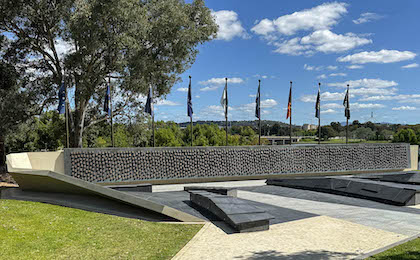The right in Australia and abroad
How the right nurtures terrorism
A lazy way to think about terrorism is to believe that there is similar physical threat from extremists on the “left” and on the “right”. It’s a convenient belief for those on the right who consistently accuse the left of being soft on terrorism, and who want to classify all terrorism as some radical “left” movement.

Police memorial Canberra
The event at Wieambilla in December, when two police officers were brutally assassinated and a civilian who came to help was murdered, should shake us from that way of thinking. The Queensland police, hardly known for wokeism or a leaning to the left, have described it as a “religiously motivated terrorist attack”. They identified the killers as followers of a cult known as premillennialism – nominally “Christian”, but with little or no connection with the moral and theological teachings of Christianity’s Gospels.
Fortunately there has been a significant decline in terrorism from another group claiming religious justification for their violence – Islamic State. On an ABC Breakfast program Rodger Shanahan, author of Islamic State in Australia, describes how IS has lost its appeal to young impressionable Muslims in Australia. (10 minutes)
Standing out in Shanahan’s description of the followers of IS is the similarity of their values, beliefs and socialization with the values, beliefs and socialization of the three terrorists at Wieambilla. They move in small social circles, often of close relatives – the ultimate adherents to “family values”. They reinforce their beliefs through social media. They reject the values of secular society and the values of the Enlightenment. To them religion is an identity rather than a consistent set of moral and theological beliefs. And they have no regard for their own lives or the lives of others.
This threat from the right has two implications for public policy. First, our intelligence services will always find it hard to find people likely to commit such acts, because they move in small circles, exchanging conspiracy theories and reinforcing one another’s fear and paranoia.
Second, and more basic, their extremism is nurtured when, to quote Margaret Thatcher, “there is no such thing as society” – when there are only individuals and families.
Restrictions on movement and on large social gatherings, necessitated as a protection against Covid, contributed to social isolation. In a Conversation article Greg Barton quotes from ASIO chief Mike Burgess who says that the lifting of Covid restrictions has reduced the risk of a terror attack, but the threat hasn’t gone away.
Covid had a sharp and immediate impact on community life. But there are less obvious, more enduring forces pulling our society apart. We have few physically gated communities, but our housing, transport and settlement policies have contributed to urban settlement patterns that hinder social mixing. We are encouraging the well-off and religious minorities to send their children to private schools, allowing public schools to become a residual system, rather than places of shared experience. We have used private health insurance as a means to give the well-off the chance to jump the queue regardless of clinical need, reducing Medicare to becoming a part of distributive welfare rather than a shared resource. We have allowed politicians on the right to establish the idea that taxes are a burden and a deprivation of our freedom, rather than a means of contributing to and sustaining our common wealth.
An insight into the Murdoch media business model
Three years ago we watched on our screens the progress of the US presidential election. Because of the way votes are counted the early figures were favouring Trump, but as the count progressed in key states the votes came in for Biden – fuelling far-out theories that the Democrats and voting-machine companies were fabricating the count.
We might recall the moment when Fox News called Arizona for Biden, which was seen by Trump’s followers not as a disappointing news item, but as a betrayal by a trusted institution. In calling Arizona for Biden the reporters had let the side down.
Writing in The Atlantic – I never truly understood Fox News until now – Brian Stelter of Harvard’s Kennedy School explains the culture of the Murdoch empire, in the context of legal action by Dominion Voting Systems, which is pursuing a $1.6 billion defamation lawsuit against Fox. He writes that “inside Fox, the prime-time stars and senior executives raged against the network’s reporters not because they doubted that Biden had won, but because the truth was too disturbing to the audience that had made them rich”.